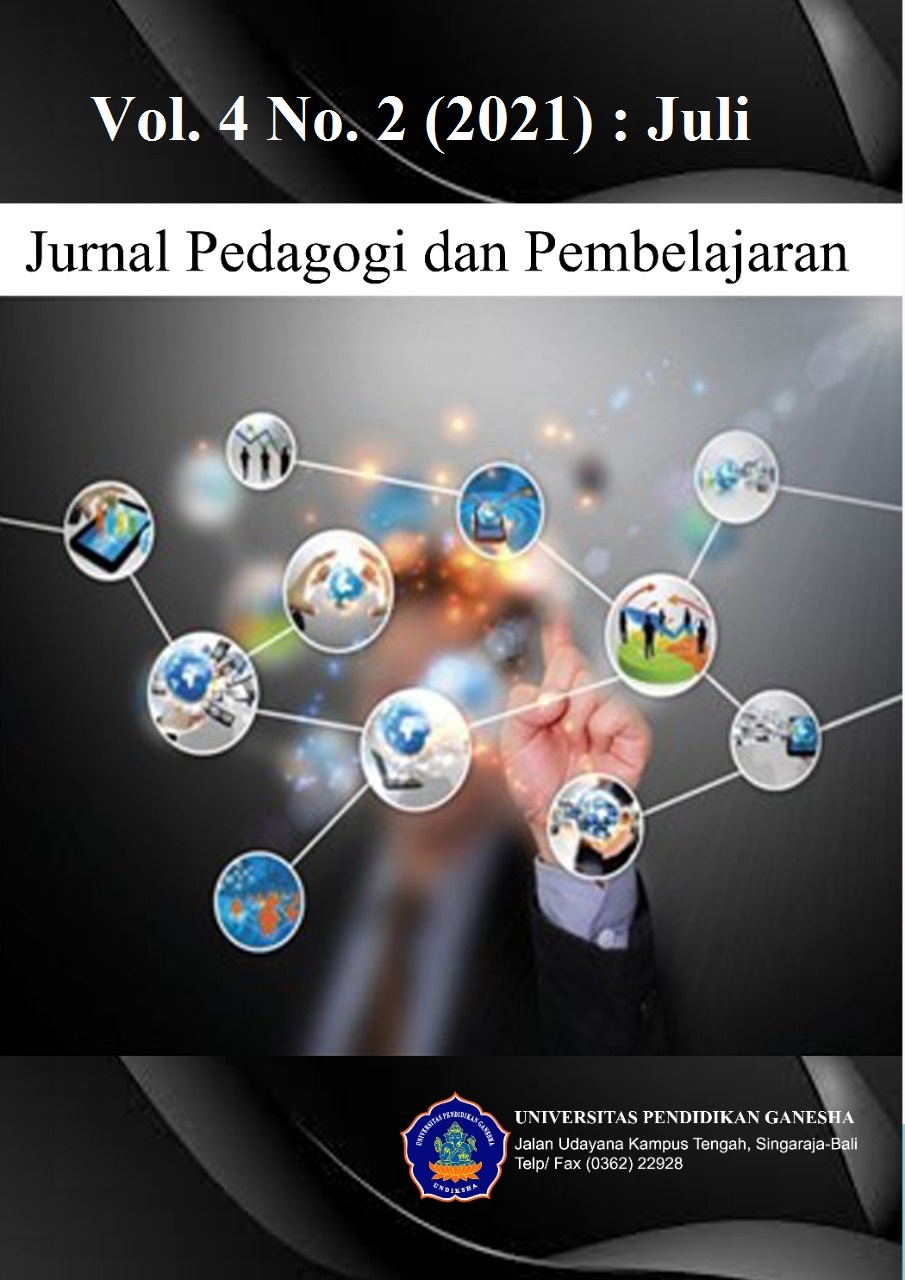Motivasi Belajar Mahasiswa pada Pembelajaran Daring Selama Pandemik Covid-19
DOI:
https://doi.org/10.23887/jp2.v4i2.38899Keywords:
Motivasi, Pembelajaran Daring, pandemi Covid 19Abstract
Penelitian ini bertujuan untuk menjelaskan secara detail bagaimana kondisi objektif motivasi yang dialami mahasiswa dalam pembelajaran daring pada masa pandemic Covid-19. Penelitian ini menggunakan pendekatan kuantitatif dengan metode survey. Penelitian dilakukan dengan melibatkan 50 mahasiswa aktif. Teknik pengumpulan data pada penelitian ini menggunakan teknik survey dengan skala likert. Survey dibuat dalam google form agar mudah diakses oleh mahasiswa. Adapun teknik analisis data yang digunakan dalam penelitian ini adalah menghitung presentase data dari setiap indikator, kemudian menginterpretasi skor presentasi data dan menganalisis setiap indikatornya secara mendalam. Hasil penelitian ini menunjukkan bahwa motivasi belajar mahasiswa pada pembelajaran daring selama pandemic covid 19 masuk dalam kategori baik, hal itu didapatkan dari skor presentase motivasi tersebut yang berjumlah 76,33%. Kesimpulan dalam penelitian ini adalah dari 8 indikator motivasi belajar yaitu konsentrasi, rasa ingin tahu, semangat, kemandirian, kesiapan, antusias atau dorongan, pantang menyerah, dan percaya diri menunjukkan kriteria baik, hal ini dapat dikatakan bahwa ditengah pandemic covid-19 yang melanda dunia, hal tersebut tidak menjadi alasan mahasiswa untuk memiliki motivasi belajar yang tinggi, walaupun dalam pelaksanaannya terdapat kekurang-kekurangan yang ditemukan, akan tetapi tidak ada pilihan lain selain mengoptimalkan pembelajaran daring, karena dalam kondisi darurat seperti ini, hanya teknologilah yang menjadi jembatan dalam mentransfer pengetahuan dari dosen ke mahasiswa.References
Agustina, M., Azizah, E. N., & Koesmadi, D. P. (2021). Pengaruh Pemberian Reward Animasi terhadap Motivasi Belajar Anak Usia Dini selama Pembelajaran Daring. Jurnal Obsesi : Jurnal Pendidikan Anak Usia Dini, 6(1), 353–361. https://doi.org/10.31004/obsesi.v6i1.1331.
Alessandro, B. (2018). Digital Skills and Competence, and Digital and Online Learning. Turin: European Training Foundation. https://www.etf.europa.eu/sites/default/files/2018-10/DSC%20and%20DOL_0.pdf.
Alhabeeb, A., & Rowley, J. (2018). E-learning critical success factors: Comparing perspectives from academic staff and students. Computers and Education, 127(August), 1–12. https://doi.org/10.1016/j.compedu.2018.08.007.
Almeida, F., & Simoes, J. (2019). The Role of Serious Games, Gamification and Industry 4.0 Tools in the Education 4.0 Paradigm. Contemporary Educational Technology, 10(2), 120–136. https://doi.org/https://doi.org/10.30935/cet.554469.
Anastasiadis, T., Lampropoulos, G., & Siakas, K. (2018). Digital Game-based Learning and Serious Games in Education. International Journal of Advances in Scientific Research and Engineering, 4(12), 139–144. https://doi.org/10.31695/ijasre.2018.33016.
Arnellis, Jamaan, E. Z., Amalita, N., Rosha, M., & Fitria, D. (2021). The Impact of Application on Calculus 1 Teaching Materials by Using Google Classroom Media to Increase Students’ Motivation. Journal of Physics: Conference Series, 1940(1), 012106. https://doi.org/10.1088/1742-6596/1940/1/012106.
Astini, Sari, N. K. (2020). Pemanfaatan Teknologi Informasi dalam Pembelajaran Tingkat Sekolah Dasar pada Masa Pandemi Covid-19. Jurnal Lembaga Penjaminan Mutu STKIP Agama Hindu Amlapura, 11(2), 13–25. https://doi.org/10.47730/jurnallampuhyang.v11i2.194.
Aziz Hussin, A. (2018). Education 4.0 Made Simple: Ideas For Teaching. International Journal of Education and Literacy Studies, 6(3), 92–98. https://doi.org/10.7575/aiac.ijels.v.6n.3p.92.
Crews, J., & Parker, J. (2017). The Cambodian Experience: Exploring University Students’. https://www.iier.org.au/iier27/crews.pdf.
Dewi, N. R., Saputri, E., Nurkhalisa, S., & Akhlis, I. (2020). The effectiveness of multicultural education through traditional games-based inquiry toward improving student scientific attitude. Journal of Physics: Conference Series, 1567(4). https://doi.org/10.1088/1742-6596/1567/4/042051.
Dhull, I. dan S. (2017). Online Learning. International Education & Research Journal (IERJ), 3(8), 32–34. https://www.researchgate.net/publication/332833360_Online_Learning.
Erwinsyah, A. (2017). Manajemen kelas dalam meningkatkan efektifitas proses belajar mengajar. TADBIR: Jurnal Manajemen Pendidikan Islam, 5, 88–105. https://journal.iaingorontalo.ac.id/index.php/tjmpi/article/view/392.
Fath, A. M. AL, & Sugito. (2021). Meningkatkan Motivasi Belajar Siswa Kelas IV Melalui Media Video. Elementary School, 8(2), 58–66. http://www.tjyybjb.ac.cn/CN/article/downloadArticleFile.do?attachType=PDF&id=9987.
Fauzi, A. R., Z., & Atok, R. Al. (2017). Penguatan Karakter Rasa Ingin Tahu dan Peduli Sosial melalui Discovery Learning. Jurnal Teori Dan Praksis Pembelajaran IPS, 2(2).
Fitriyani, Y., Fauzi, I., & Sari, M. Z. (2020). Motivasi Belajar Mahasiswa Pada Pembelajaran Daring Selama Pandemik Covid-19. Profesi Pendidikan Dasar, 7(1), 121–132. https://doi.org/10.23917/ppd.v7i1.10973.
Fomunyam, K. G. (2019). Education and the Fourth Industrial Revolution : Challenges and Possibilities for Engineering. International Journal of Mechanical Engineering and Technology (IJMET), 10(8), 271–284. https://www.academia.edu/40258817/ Education _and_the_Fourth_Industrial_Revolution_Challenges_And_Possibilities_For_Engineering_Education.
Gamar, M. M., Al Faruq, M. S., & Lina, L. (2018). Challenging the Indonesian Primary Education in Industrial Revolution 4.0 Era. 3rd International Conference on Education Management and Administration (CoEMA 2018), 269, 46–48. https://doi.org/10.2991/coema-18.2018.12.
Husaini, M. (2019). Pemanfaatan Teknologi Informasi Dalam Bidang Pendidikan (E-education). JURNAL MIKROTIK, 2(1). https://doi.org/10.31219/osf.io/ycfa2.
Kivinen, J., Smola, A. J., & Williamson, R. C. (2021). Analysis the Influence of Online Learning on Students’ Learning Enthusiasm. 6(1), 1–11. https://www.learntechlib.org/p/219899/.
Lee, J., & Martin, L. (2017). Investigating Students’ Perceptions of Motivating Factors of Online Class Discussions. International Review of Research in Open and Distance Learning, 18(5), 148–172. https://doi.org/10.19173/irrodl.v18i5.2883.
Mather, M., & Sarkans, A. (2018). Student Perceptions of Online and Face-to-Face Learning. International Journal of Curriculum and Instruction, 10(2), 61–76. https://core.ac.uk/download/pdf/268081682.pdf.
Mustofa, M. I., Chodzirin, M., Sayekti, L., & Fauzan, R. (2019). Formulasi Model Perkuliahan Daring sebagai Upaya Menekan Disparitas Kualitas Perguruan Tinggi. Walisongo Journal of Information Technology, 1(2), 151. https://doi.org/10.21580/wjit.2019.1.2.4067.
Nurhayati, E. (2019). Penerapan Buku Saku dengan Pendekatan Saintifik untuk Meningkatkan Motivasi dan Hasil Belajar Siswa Pasca Gempa Bumi. Jurnal Kependidikan: Jurnal Hasil Penelitian Dan Kajian Kepustakaan Di Bidang Pendidikan, Pengajaran Dan Pembelajaran, 5(2), 94–99. https://doi.org/10.33394/jk.v5i2.1804.
Orgaz, F., Moral, S., & Domínguez, C. (2018). Student’s Attitude and Perception with the Use of Technology in the University. Journal of Educational Psychology – Propositos Y Representaciones, 6(2), 277–299. https://doi.org/http://dx.doi.org/10.20511/.
Parker, P. C., Perry, R. P., Hamm, J. M., Chipperfield, J. G., Pekrun, R., Dryden, R. P., Daniels, L. M., & Tze, V. M. C. (2021). A motivation perspective on achievement appraisals, emotions, and performance in an online learning environment. International Journal of Educational Research, 108(March), 101772. https://doi.org/10.1016/j.ijer.2021.101772.
Pilkington, O. A. (2018). Active Learning for an Online Composition Classroom : Blogging as an Enhancement of Online Curriculum. Journal of Educational Technology Systems, 47(2), 1–14. https://doi.org/10.1177/0047239518788278.
Purwanto. (2016). Pengaruh Konsekuensi Perilaku dan Motivasi Belajar Terhadap Hasil Belajar. Jurnal Pendidikan Dan Kebudayaan. https://doi.org/10.24832/jpnk.v13i69.347.
Reyneke, J. A., Davis, K., Ed, D., & Chairperson, D. (2020). Graduate School of Education and Psychology What Drives Educators : a Mixed Methods Study on the Impact of Motivasions and Attitudes on Technology Integration Practices in the k-8 Classroom Setting a dissertation submitted in partial satisfaction of the r. https://media.proquest.com/media/hms/PFT/2/dpW9H?_s=6uXrF5QyJpxfaXw6sBDaaXw33XA%3D.
Riaz, A. (2018). Effects of Online Education on Encoding and Decoding Process of Students and Teachers. International Conference E-Learning, 42–48. https://doi.org/https://files.eric.ed.gov/fulltext/ED590288.pdf.
Sarıçoban, A., Tosuncuoğlu, I., & Kırmizi, Ö. (2019). A Technological Pedagogical Content Knowledge (TPACK) Assessment of Preservice EFL Teachers Learning to Teach English as a Foreign Language. Journal of Language and Linguistic Studies, 15(3), 1122–1138. https://doi.org/10.17263/jlls.631552.
Sepita, S. F., & Suryanti, S. (2020). Pengaruh Pembelajaran Daring Terhadap Hasil Belajar Kognitif Mahasiswa Pada Mata Kuliah Limnologi. Journal of Research and Education Chemistry, 2(2), 102. https://doi.org/10.25299/jrec.2020.vol2(2).5826.
Siswati, B. H., Hariyadi, S., & Corebima, A. D. (2017). Pengaruh Model Pembelajaran RQAAD Terhadap Motivasi Belajar dan Keterampilan Metakognitif Mahasiswa Mata Kuliah Strategi Belajar Mengajar Biologi. Jurnal Pendidikan Biologi, 7(2), 108–116. http://jurnal.unimed.ac.id/2012/index.php/JPB.
Sugiyono. (2018). Metode Penelitian Kuantitatif, Kualitatif dan R&D. CV Alfabeta.
Suyanti, S., Sari, M. K., & Rulviana, V. (2021). Media Powtoon Untuk Meningkatkan Motivasi Belajar Siswa Sekolah Dasar. Elementary School: Jurnal Pendidikan Dan Pembelajaran Ke-SD-An, 8(2), 322–328. https://doi.org/10.31316/esjurnal.v8i2.1468.
Tinmaz, H., & Lee, J. H. (2019). A Preliminary Analysis on Korean University Students’ Readiness Level for Industry 4.0 Revolution. Participatory Educational Research (PER), 6(1), 70–83. https://doi.org/http://dx.doi.org/10.17275/per.19.6.6.1.
Traxler, J. (2018). Distance learning—Predictions and possibilities. Education Sciences, 8(1), 1–13. hhttps://doi.org/10.3390/educsci8010035.
Vanslambrouck, S., Zhu, C., Lombaerts, K., Philipsen, B., & Tondeur, J. (2018). Students’ motivation and subjective task value of participating in online and blended learning environments. Internet and Higher Education, 36, 33–40. https://doi.org/10.1016/j.iheduc.2017.09.002.
Yin, Y., & Qin, S.-F. (2019). A Smart Performance Measurement Approach for Collaborative Design in Industry 4.0. Advances in Mechanical Engineering, 11(1), 1–15. https://doi.org/10.1177/1687814018822570.
Downloads
Published
How to Cite
Issue
Section
License
Authors who publish with Jurnal Pedagogi dan Pembelajaran agree to the following terms:- Authors retain copyright and grant the journal the right of first publication with the work simultaneously licensed under a Creative Commons Attribution License (CC BY-SA 4.0) that allows others to share the work with an acknowledgment of the work's authorship and initial publication in this journal
- Authors are able to enter into separate, additional contractual arrangements for the non-exclusive distribution of the journal's published version of the work (e.g., post it to an institutional repository or publish it in a book), with an acknowledgment of its initial publication in this journal.
- Authors are permitted and encouraged to post their work online (e.g., in institutional repositories or on their website) prior to and during the submission process, as it can lead to productive exchanges, as well as earlier and greater citation of published work. (See The Effect of Open Access)













